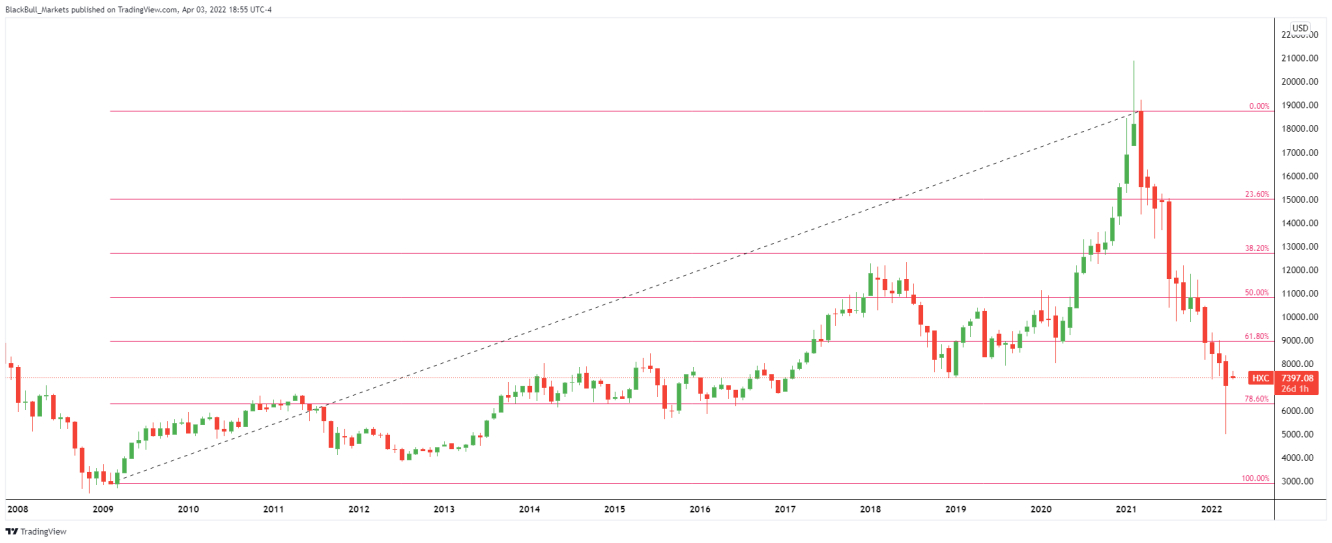Regulations targeting a number of sectors — from technology to real estate and education — have hammered Chinese stocks late last year and into 2022. Although many economists remain bullish on Chinese stocks’ potential, Beijing’s relationship with the Kremlin is now weighing on investor appetite for Chinese shares.
On Friday, April 1, Shanghai Composite Index tumbled 5.8% year on year and is down 9.6% from the start of the year. The SZSE Component Index, the benchmark index of the tech-heavy Shenzhen Stock Exchange, is also down 13.2% year over year on Friday and 17.3% lower year-to-date.
The Hang Seng China Enterprises Index, which tracks Chinese companies listed in Hong Kong, likewise tanked 31.9% from last year as of Friday and is down 8% year-to-date.
2021 In Retrospect
In 2021, Chinese companies were hit with regulatory changes as Beijing sought to weed out anti-competitive behavior, online gaming addiction, excessive childcare, and education costs and eliminate other risks in the private sector.
Beijing’s crackdown on the tech and financial technology sector led to the record fine of over 18 billion yuan (around $3 billion) on Alibaba (NYSE:BABA), the transition of Alibaba’s mobile payments arm, Ant Group into a financial holding company and a raft of rules aimed at data security and anti-monopoly, among others.
Last year, the government also targeted the education sector, launching sweeping rules that upended for-profit tutoring companies. New rules aimed at protecting minors also took a toll on the operations and revenue of big gaming companies like Tencent Holdings (OTC:TCEHY) and NetEase (NASDAQ:NTES).
Towards the end of last year, the vulnerability of China’s property sector came to light as China Evergrande's (OTC:EGRNY) massive debt pileup of more than $300 billion highlighted the risks of the country’s highly-leveraged real estate sector that many fear would lead to a broader contagion affecting the country's financial industry and the global markets.
These factors led to a sell-off of Chinese stocks at home and in the US, with the NASDAQ Golden Dragon China Index, which tracks 98 of China's biggest US-listed firms, posting its sharpest drop since the financial crisis of 2008 in March after reaching an all-time high in February 2021. The HXC is trading lower than its 2008 peak after retracing approximately 70% of the gains it made since its 2008 bottom.
Booting Chinese Stocks From US Exchanges
Geopolitical tensions and data security concerns prompted the US Securities and Exchange Commission to tighten its auditing rules on Chinese companies listed on US bourses. This threatens the US listing status of companies like KFC operator Yum China Holdings (NYSE:YUMC), Twitter-like Weibo (NASDAQ:WB), Baidu (NASDAQ:BIDU), and iQIYI (NASDAQ:IQ).
Even before these firms were added to the SEC’s “provisional list” of companies that are found to be violating the US Holding Foreign Companies Accountable Act, the US has already booted several Chinese companies — including China’s big three telecommunications companies — over the past year, citing data security concerns and other alleged violations.
Bullish on Chinese Stocks
Despite uncertainties over the outlook for China’s regulatory environment in the coming years, some global banks and economists, including Bernstein, Credit Suisse, and Goldman Sachs remain bullish on Chinese stocks.
Credit Suisse upgraded its outlook on China, noting that values may be depressed, while Goldman Sachs underscored the attractiveness of Chinese assets due to the liberalization and reform measures in the Chinese capital markets, which according to the bank backs its view that China equity is an asset class “that is too big, and too vibrant to ignore.”
Geopolitical Woes, COVID-19 Risks Remain
However, some economists are polarized on their outlook on Chinese stocks due to lingering geopolitical tensions and the resurgence of COVID-19 cases that recently prompted lockdowns in two of the country's most populous cities.
Reports highlighting Beijing’s relationship with Russia might be reducing investor appetite for Chinese stocks. Beijing has refused to back a global condemnation of the Kremlin’s military actions against Ukraine, refusing to describe the attacks as an invasion.
US-listed Chinese companies have lost over $1.1 trillion in market value in recent weeks due to these concerns, and Asian Corporate Governance Association’s Jamie Allen told CNBC over a week ago that the delisting of US-listed Chinese firms could come in the next two to three years.
